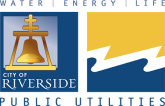Riverside Public Utilities continues to enhance the City of Riverside’s water supply reliability through a comprehensive recycled water program. The use of recycled water frees up drinking water supply, avoids costly imported water supplies and increases our water supply reliability. Every gallon of recycled water used results in a gallon of drinking water saved.
What is recycled water?
Recycled water, also called reclaimed water, is highly treated wastewater that can be reused again
for a variety of purposes, including agriculture and landscape irrigation, industrial processes, and replenishing groundwater basins.
Is it safe for children and pets to play on grass irrigated by recycled water?
Yes, the California Department of Health Services has very high treatment standards for recycled water. Riverside Public Utilities recycled
water meets or exceeds all State standards for water used for irrigation and other uses with similar public exposure.
What is recycled water used for?
The State has identified approved uses for recycled water in California based on the level of treatment.
Riverside Public Utilities produces and distributes disinfected, tertiary treated recycled water (water treated three times).
This water can be used for landscape irrigation and replenishing groundwater basins.
This water is not approved for drinking.
What makes recycled water safe?
The State of California regulates how recycled water can be used.
Recycled water gets treated three times at water reclamation plants. During the first treatment, large solids are removed.
The second treatment uses bacteria to remove approximately 90% to 95% of the remaining solids and uses a disinfectant,
such as chlorine, to destroy bacteria, viruses, and other pathogens. The third treatment process includes filtration and
reverse osmosis as required. The treatment methods duplicate and accelerate nature’s purifying actions.
Riverside Public Utilities produces and distributes disinfected recycled water, which is treated three times.
Is recycled water regulated?
Yes. There are a variety of laws, regulations and statewide policies that govern how recycled water is defined, what it can be used for, and under what conditions. California laws regulating recycled water are located in the Health and Safety Code, the Water Code, and Titles 17 and 22 of the California Code of Regulations. Title 17 of the California Code of Regulation describes the requirements for backflow prevention devices required at a site when recycled water is used. The requirements prevent recycled water from getting into the public drinking water system in the event a cross-connection occurs where recycled water is used. Title 22 of the California Code of Regulations describes the treatment requirements for recycled water, as well as approved uses based on the level treatment. Also included in Title 22 are the Use Area Requirements which describe restrictions of recycled water uses and the requirement to notify the public through signage that a site is using recycled water.
What is Purple Pipe?
Recycled water is delivered through a parallel distribution system that is completely separate from the drinking water infrastructure.
This separate system uses what is known internationally as “Purple Pipe” to keep these valuable sources of water separate and
make recycled water system easily identifiable. The use of Purple Pipe infrastructure helps ensure that cross-connections between two systems do not occur.
Can I get recycled water at my property?
The Jackson Street Recycled Water Pipeline Project will expand the recycled water line by a little more than three miles along Jackson Street (Please see Project Map). The first phase of the project will serve schools, parks and select industrial customers along the pipeline.
https://water.ca.gov/
Regulatory Links
California Drinking Water-Related Laws
Division of Drinking Water’s Recycled Water Information
California Department of Water Resources
California Water Resources Control Board
Riverside Regional Water Quality Control Board
